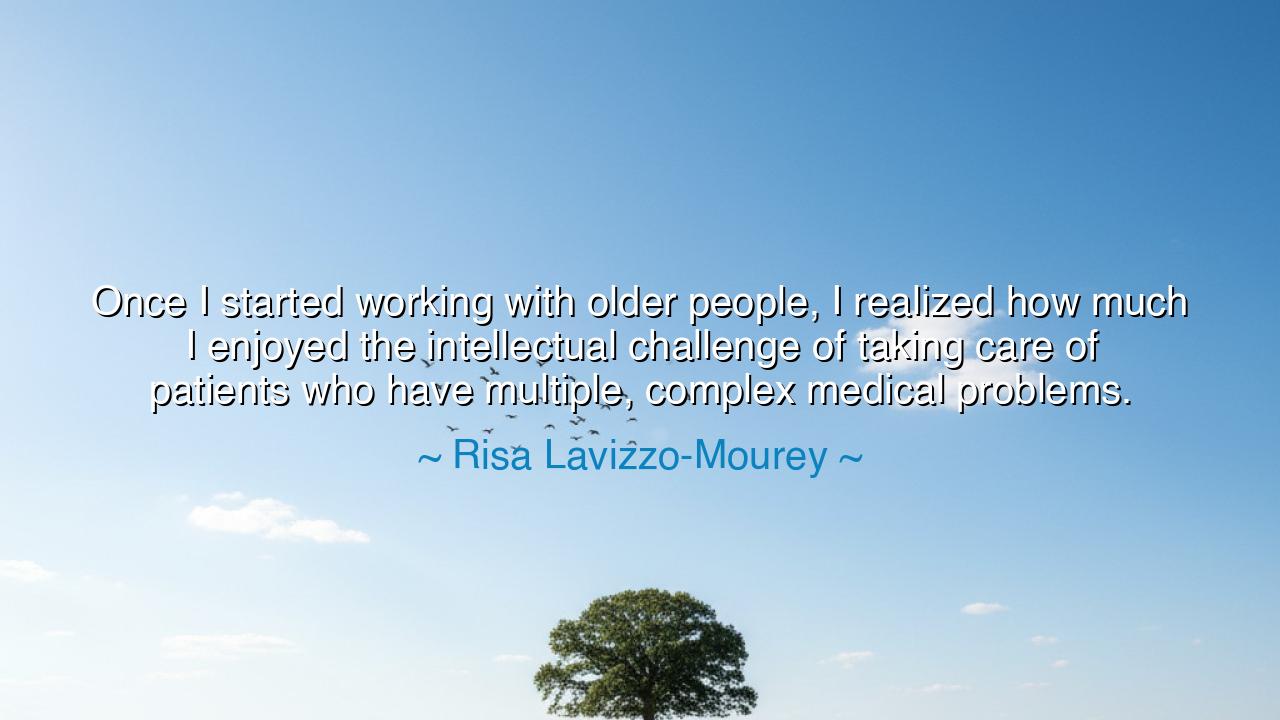
Once I started working with older people, I realized how much I
Once I started working with older people, I realized how much I enjoyed the intellectual challenge of taking care of patients who have multiple, complex medical problems.






When Risa Lavizzo-Mourey said, “Once I started working with older people, I realized how much I enjoyed the intellectual challenge of taking care of patients who have multiple, complex medical problems,” she spoke not only as a physician but as a philosopher of compassion. In her words, we hear the voice of one who has discovered that wisdom and service are inseparable, that caring for the elderly is not a burden but a profound calling. Her statement reflects a truth that has echoed since the dawn of healing itself: that the greatest art of medicine is not in curing the simple, but in understanding the complex beauty of human frailty. In the fragile balance of age and illness, she found not despair, but challenge — the noble challenge of bringing light to the twilight of life.
To care for the aged is to gaze upon the living history of humanity. In the lines of their faces are written decades of struggle and triumph, love and loss. Each ailment in their body is a chapter in the story of survival — heart and lungs marked by labor, bones shaped by years of toil, and minds that have witnessed worlds rise and fall. Lavizzo-Mourey’s joy in this work reveals an understanding deeper than science: that the old are not merely patients, but keepers of wisdom, and to tend to them is to engage in a dialogue with time itself. She sees in their ailments not confusion, but the intricate harmony of life’s long journey — a tapestry woven of biology, memory, and endurance.
The origin of her words lies in her long service as a physician, researcher, and leader — one who sought to reform not only how medicine is practiced, but how it is valued. In her early years of training, like many young healers, she might have imagined medicine as a field of clear answers and quick victories. Yet in caring for older patients, she encountered the mystery of complexity — diseases overlapping, symptoms contradicting, treatments colliding. It is there, amid uncertainty, that she found both her challenge and her purpose. For true medicine is not the pursuit of perfection, but the practice of patience, humility, and continuous learning. The elderly, with their countless interconnected conditions, demand of the healer not only knowledge, but wisdom, empathy, and endurance.
The ancients understood this truth as well. In the temples of Asclepius, the Greek god of healing, the oldest patients were considered sacred, for they embodied both suffering and wisdom. The physicians who treated them were required to meditate before entering the healing chamber, to prepare their minds for the art of discernment — the ability to see through layers of illness to the essence of the person beneath. They knew that curing a fever or a wound was simple, but understanding the tangled web of the human condition was divine work. So too did Lavizzo-Mourey realize that caring for the aged is not a test of medicine alone, but a test of the soul’s endurance and the mind’s depth.
There is a story from our own age that reflects this same truth — the life of Dr. Atul Gawande, who wrote Being Mortal. Like Lavizzo-Mourey, he came to see that modern medicine’s obsession with fixing and prolonging life often blinds it to the deeper purpose of healing: to preserve dignity, meaning, and comfort, especially in the final years. Gawande discovered that caring for the elderly requires more than skill — it requires conversation, listening, and humility. Both he and Lavizzo-Mourey remind us that medicine is not a contest of mastery over disease, but a partnership with the human spirit. And in that partnership, the physician becomes a student as much as a guide.
Lavizzo-Mourey’s insight also carries a broader lesson for every field of life: that the greatest challenges are also the richest teachers. Where others might see complexity and retreat, she saw opportunity for growth. So it is in all things worth doing — whether one tends to bodies, minds, or communities. The easy tasks sharpen only the hands; the difficult ones refine the soul. When we engage with the intricate, when we embrace the complicated rather than flee from it, we grow closer to understanding both others and ourselves. To serve the vulnerable is to practice strength of heart; to face the intricate is to deepen one’s wisdom.
Thus, let this teaching be passed down: Do not fear the complex, for in complexity lies truth. Seek not only the clear and simple, but the layered and profound. Whether in medicine, art, or daily life, approach the tangled problems of the world as Lavizzo-Mourey did — with curiosity, humility, and courage. The aged, the frail, the difficult — they are not burdens to be endured, but teachers of compassion and patience. For every wrinkle hides a lesson, every ailment a mystery, and every act of care a chance to honor the sacred bond between healer and human.
And so, in the spirit of the ancients, let us remember this: the wise do not flee from complexity — they find harmony within it. In the challenges that test the mind and stretch the heart, we discover the true measure of our humanity. Risa Lavizzo-Mourey’s words are not only about medicine, but about life itself: that the most meaningful work is found not where the path is smooth, but where the terrain is rough, the questions are deep, and the soul must rise to meet them.






AAdministratorAdministrator
Welcome, honored guests. Please leave a comment, we will respond soon